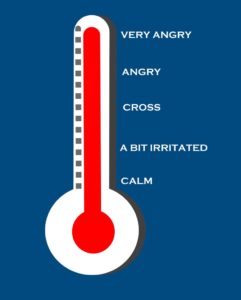
How do emotions get us into trouble?
Some strong emotions are enjoyable, but some can knock us off balance. Becoming overwhelmed with emotions may lead to unhealthy reactions and misunderstandings, with the potential to get us into trouble at work, at home, or in social settings.
Common expressions like ”he was blinded by emotion” or “I was so mad I had smoke coming out of my ears” are apt metaphors for how powerful feelings derail us. Once triggered, anger can escalate quickly, leading to a refractory period: that is, being so gripped by the strong feeling that we simply can’t take in any information that doesn’t fit, maintain, or justify whatever we’re feeling at that moment. We see only that which affirms our feelings. Thinking becomes distorted, perceptions skew off-base, and memory of the triggering emotion is garbled.
Anger and fear are emotions that usually provoke strong reactions. Let’s look at anger: When I see clients for couples’ therapy, they will come to the session describing a disagreement from totally different points of view. What may have started as a calm discussion about where to go on vacation escalates to an all-out fight, with each partner believing their point of view is right. At some point, one partner or both goes into what is referred to as ‘” diffuse physiological arousal” or DPA, also often called “flooding.” This is a result of the fight, flight, or freeze response to stress. Once our emotions have escalated, we are unable to see the big picture and unable to take in new information.
How do emotions, especially anger, get triggered?
In the scenario I’ve described, a couple wants a good relationship, but a calm discussion escalates quickly. Often this is because cues get misinterpreted; what one person thinks of as an innocent statement is cause for high emotion in the other. We misinterpret cues for several reasons, but a powerful one—all the more so for being largely unconscious—is the “imported script.” An imported script is a deeply seated pattern from childhood, such as not being listened to, or feeling like our opinions or needs don’t matter. So when our partner ignores our suggestions for where to go on vacation, we don’t feel heard, leading to the reflective or automatic reaction of anger. We quit listening and react in whatever way is consistent with our personal anger profile.
We all have our own ways that anger grabs us. Some become flooded in an instant but cool down quickly. Others stay in slow boil mode until they spike and then take longer to calm down. And still, others may not express outward anger and instead try to suppress it, perhaps because in their family they needed to keep the peace so that their parents wouldn’t become enraged.
When one partner gets triggered in this way, then the other is too: the emotional build-up is reciprocal. A strong emotional reaction from a partner will elicit some kind of response even if it is not apparent on the outside. Each has a role to play in the disagreement. Typical reactions are to yell or scream (the fight response); to run from the room, withdraw, or take a drink (flight); or to refuse to engage in further conversation, creating a stalemate (freeze).
So how can you change maladaptive automatic emotional reactions?
Learning to regulate emotions is not the same as controlling them. Controlling implies a kind of clenched-jaw, tightly fisted suppression. Clamping down on emotions may change how we express our feelings, but doesn’t change the experience of emotion, and comes at a physical and cognitive cost.
So the tricky part is becoming aware of our feelings in the moment and taking responsibility for what we bring to the situation. Luckily, effective techniques exist for better emotional regulation. Let’s look at a few.
Practice self-soothing. Once aware of being flooded (or that we’re headed in that direction), we can pause to collect ourselves. Focusing on slowing breathing, heart rate, noticing sensations of warmth, and letting go of unnecessary muscle tension can eventually change the way you feel and express strong emotion and allow us to keep working on issues more productively and compassionately. I have seen profound effects from this step alone.
Shorten the refractory period. The first step in slowing down enough to better process information is to become aware of the sometimes subtle cues, such as the onset of tension, that lead to over-arousal and emotional escalation. Gaining a clearer understanding of how strong emotions function can help you identify your experience as it is happening.
Employ reappraisal. By considering the situation and changing our interpretation of it, we can respond more flexibly. When we increase our attention to our reactions rather than blaming someone else, or just giving into our typical response, we gain insights into our triggers so that we can express our feelings with strength.
Other helpful techniques include:
- Increasing insight into imported memories/scripts
- Changing your relationships to emotions/thoughts (decentering)
- Developing the ability to tolerate uncomfortable emotions
- Returning mind and body to homeostasis through deep breathing and learning to bring heart-rate down
- Increasing understanding of the mind-body relationship
- Switching from automatic reaction to intentional responding
Emotions, even strong ones, don’t have to derail you—or your relationships. With practice, we can experience them differently.


Leave a Reply